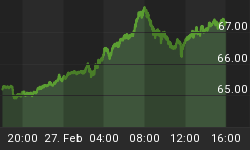Below is an excerpt from a commentary originally posted at www.speculative-investor.com on 15th January 2015. Excerpts from our newsletters and other comments on the markets can be read at our blog: http://tsi-blog.com/
Changes in asset prices or any other prices do not cause changes in money supply, although many of the people who comment on the financial markets and economics believe otherwise. We were recently reminded of this mistaken belief when reading an analysis of oil's large price decline that included the assertion that hundreds of billions of dollars had been eliminated from the economy as a result of this price change.
Plunges in asset prices invariably provoke comments along the lines of "a huge amount of money has just been wiped out". For example, when the US real estate and stock markets tanked during 2008 a popular line of argument involved comparing the Fed's QE with the massive declines in market value to show that the amount of money added by the Fed was small in relation to the amount of money subtracted by the asset-price collapse. The conclusion of this argument was that the Fed's money-creation would fail to boost prices. However, we explained at the time that this argument was wrong to the core -- that no actual money had been destroyed by the dramatic price action and, therefore, that the Fed's QE resulted in a large net addition of money that would inevitably lead to rising prices somewhere in the economy.
Due to the persistent popularity of the wrongheaded idea that price declines cause money-supply declines and the likelihood that this idea will become even more popular during the next bear market in US equities, it is worth reviewing exactly how money can vanish under the current monetary system. In doing so we will refer to the Fed and the US money supply, but as far as we know the same concepts apply in all of today's developed economies.
The first way that the US money supply can shrink is via the Fed's extraction of dollars. This is the opposite of QE. When the Fed conducts a QE operation or monetises assets under a conventional open market operation, it buys bonds from Primary Dealers (PDs). This process adds 'covered' money to the economy, that is, it adds dollars to the economy by boosting the deposit accounts held by the PDs at commercial banks and adds an equivalent quantity of reserves to the deposits held by commercial banks at the Fed. By selling bonds to PDs the Fed achieves the opposite: it removes 'covered' money from the economy.
The second way that money can vanish is via the contraction of commercial bank credit, which can occur as a result of bank customers voluntarily paying back their loans, banks forcing loan repayments by calling-in their loans, or banks selling assets. In the same way that new bank deposits (new money units) are created when a commercial bank makes a loan or monetises an asset, the amount of money held in bank deposits contracts when a loan is repaid or a previously-monetised asset is sold.
As an aside, defaulting on a bank loan does not cause the money supply to decline. In this situation, the money that was created when the loan was made remains within the economy.
The third way that money can go to the proverbial "money heaven" is via a bank going bust and the bank's depositors not being made whole by the sale of the business to another bank or by the government's deposit insurance or by central-bank bailout. As far as we know this has never happened in the US under the post-1971 monetary system, but it has happened in the euro-zone (Cyprus).
There is no fourth way.
Samples of our work (excerpts from our regular commentaries) and additional thoughts on the financial markets (and other stuff) are provided at our blog:
http://tsi-blog.com/















